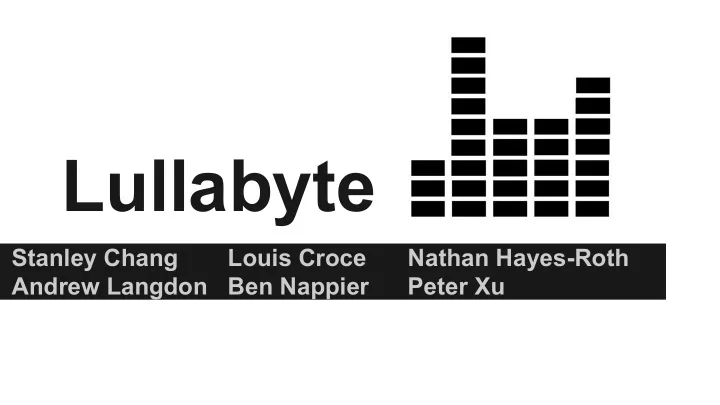

Lullabyte Stanley Chang Louis Croce Nathan Hayes-Roth Andrew Langdon Ben Nappier Peter Xu
Overview ● Goals ○ Generate MIDI music files ○ C-like syntax ○ Allow algorithmic or direct composition ● Building blocks ○ Construct sounds from ints, doubles, pitches ○ Construct tracks from series of sounds ○ Layer tracks into a song
Program Structure ● main function void main() {...} ● global variable declarations int global_i; sound[] sounds; ● function definitions type function ( types args ) {...}
Functions type function(){ // local variable declarations // global variable assignments // control flow // other function calls // optional return value }
Arrays ● Dynamic. Length is not fixed ● Assigning element beyond length pads intermediate elements with default type values (0, 0.0, false, C0, |C0|:0.0:0, etc.) ● Accessing element beyond length throws IOB error ● Reason: Make it easier for developer to not worry about checking array lengths since musical tracks change a lot throughout development
Types ● int, double, boolean ● Pitch: C0, A1, Bb4, G9, … ● Sound: “<pitch(es)> : <double> : <int>” |C0|:0.25:100 |C5, E4, G3|:0.25:70
Statements & Control Flow ● if, while, for, return ● loop ( <var> : <array> ) { //body } ● Reference to <var> in body is treated as “array[i]” ● Easy way to loop through sound arrays and make modifications with cleaner code
Built-in Functions ● length(<array>) ● setPitches(<sound>, ● randomInt(<int>) <pitch>) ● randomDouble(<double>) ● setDuration(<sound>, ● bpm(<int>) <double>) ● write() ● setAmplitude(<sound>, ● play() <int>) ● print(<expr>) ● getPitches(<sound>) ● mixDown(<sound[]>, <int>) ● getDuration(<sound>) ● getAmplitude(<sound>)
mixDown(sounds, track) ● most important built-in function ● writes array of sounds to midi ● programmer specifies track number ● can be called multiple times ● sounds appended to specified track
Architectural Design
Front End ● scanner.mll ● parser.mly ● ast.ml
Back End ● interpreter.ml ○ rules of our compiler ● typechecking ○ variable type is stored on value declaration ○ function type is stored in module
Conversion to Midi ● Bytecode Conversion 120 p ○ catches .llb Failures 0[[Bb5]:0.5:100,[C6]:0.5:100, [C6]:0.5:100, [Bb5]:0.5:100] ○ bpm, write, play, or both 1[[Bb4, D4, G3]:1.:100,[E4, G3, C3]:1.:100] ○ tracks 0[[Bb5]:0.5:100] ● BytecodeTranslator.java ● JFugue “V1 [72]/0.5a100+[76]/0.25a100+[76]/0. 5a100”...
Testing ● testing suite ○ *.llb and *.out ● type check test ○ breaking the compiler
Lessons Learned ● MicroC Slides ● Version Control ● Testing ● Strength in Numbers ● Communication ● Accountability
Hey Jude Demo
Thank You Any Questions?
Recommend
More recommend